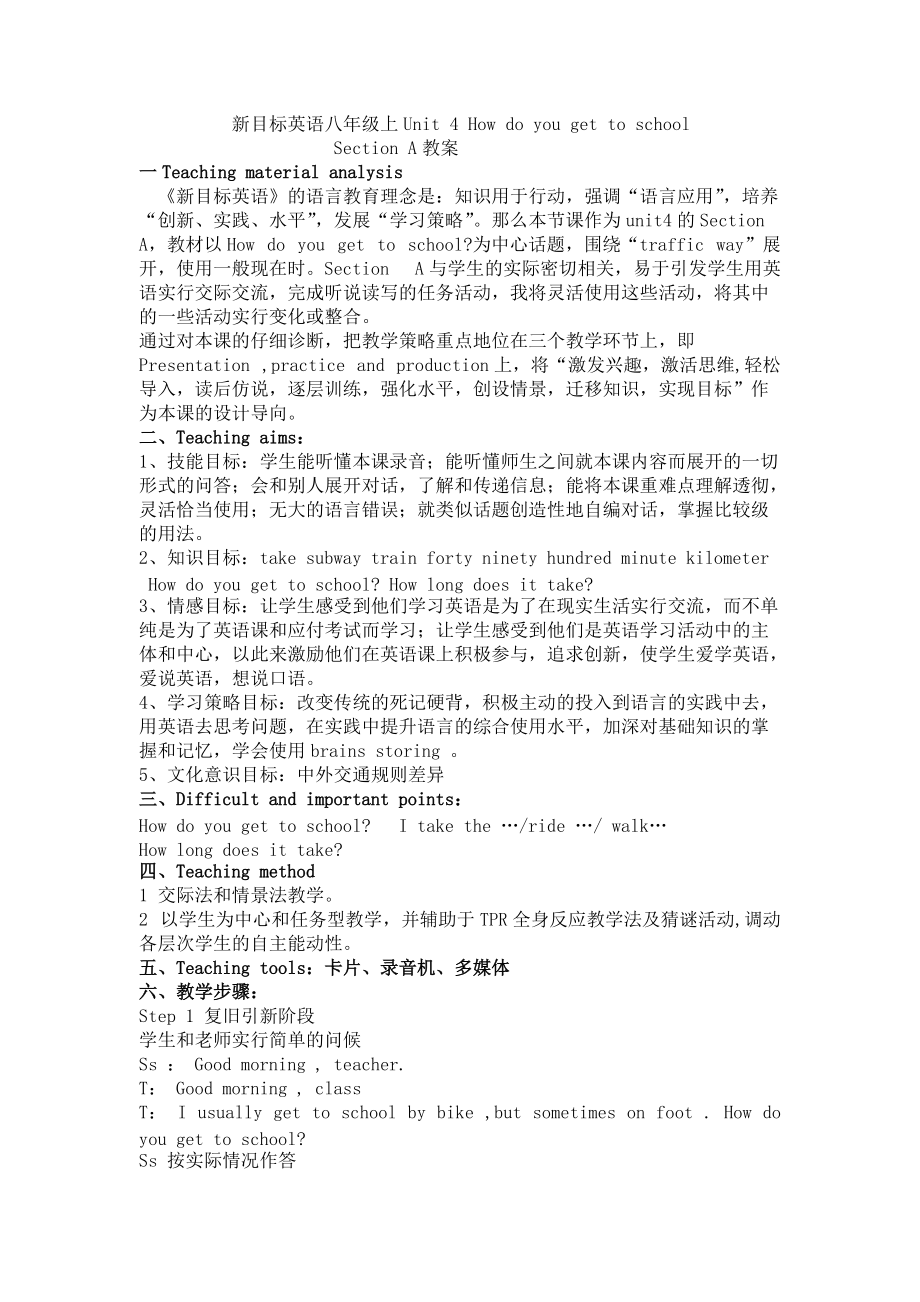《新目標(biāo)英語八年級上Unit 4 How do you get to school》由會員分享���,可在線閱讀��,更多相關(guān)《新目標(biāo)英語八年級上Unit 4 How do you get to school(3頁珍藏版)》請在裝配圖網(wǎng)上搜索���。
1、新目標(biāo)英語八年級上Unit 4 How do you get to schoolSection A教案一Teaching material analysis新目標(biāo)英語的語言教育理念是:知識用于行動�,強調(diào)“語言應(yīng)用”,培養(yǎng)“創(chuàng)新����、實踐、水平”����,發(fā)展“學(xué)習(xí)策略”�����。那么本節(jié)課作為unit4的Section A�,教材以How do you get to school?為中心話題���,圍繞“traffic way”展開����,使用一般現(xiàn)在時��。Section A與學(xué)生的實際密切相關(guān)�����,易于引發(fā)學(xué)生用英語實行交際交流�����,完成聽說讀寫的任務(wù)活動����,我將靈活使用這些活動,將其中的一些活動實行變化或整合����。通過對本課的仔細(xì)診斷,把
2��、教學(xué)策略重點地位在三個教學(xué)環(huán)節(jié)上��,即Presentation ,practice and production上�����,將“激發(fā)興趣���,激活思維,輕松導(dǎo)入���,讀后仿說,逐層訓(xùn)練�,強化水平,創(chuàng)設(shè)情景����,遷移知識,實現(xiàn)目標(biāo)”作為本課的設(shè)計導(dǎo)向。二�����、Teaching aims:1�����、技能目標(biāo):學(xué)生能聽懂本課錄音����;能聽懂師生之間就本課內(nèi)容而展開的一切形式的問答;會和別人展開對話���,了解和傳遞信息���;能將本課重難點理解透徹,靈活恰當(dāng)使用�;無大的語言錯誤;就類似話題創(chuàng)造性地自編對話��,掌握比較級的用法�����。2��、知識目標(biāo):take subway train forty ninety hundred minute kilometer
3����、 How do you get to school? How long does it take?3、情感目標(biāo):讓學(xué)生感受到他們學(xué)習(xí)英語是為了在現(xiàn)實生活實行交流���,而不單純是為了英語課和應(yīng)付考試而學(xué)習(xí)�����;讓學(xué)生感受到他們是英語學(xué)習(xí)活動中的主體和中心�,以此來激勵他們在英語課上積極參與��,追求創(chuàng)新�,使學(xué)生愛學(xué)英語,愛說英語�����,想說口語����。4、學(xué)習(xí)策略目標(biāo):改變傳統(tǒng)的死記硬背,積極主動的投入到語言的實踐中去�����,用英語去思考問題����,在實踐中提升語言的綜合使用水平,加深對基礎(chǔ)知識的掌握和記憶�,學(xué)會使用brains storing 。5����、文化意識目標(biāo):中外交通規(guī)則差異三、Difficult and important
4�、points:How do you get to school? I take the /ride / walkHow long does it take?四、Teaching method1 交際法和情景法教學(xué)�。2 以學(xué)生為中心和任務(wù)型教學(xué),并輔助于TPR全身反應(yīng)教學(xué)法及猜謎活動,調(diào)動各層次學(xué)生的自主能動性��。五�、Teaching tools:卡片、錄音機(jī)����、多媒體六�、教學(xué)步驟:Step 1 復(fù)舊引新階段學(xué)生和老師實行簡單的問候Ss : Good morning , teacher.T: Good morning , classT: I usually get to school by bike
5���、 ,but sometimes on foot . How do you get to school?Ss 按實際情況作答S1: I ride my bike S2: I take the bus. S3: T: Very good . Youre clever. Lets learn Unit 4 Section A . 之后板書:“Unit 4 How do you get to school?”Step II Presentation1 T: If you are here ,but your school is in Shanghai. How do you get to school
6、?Ss: I take the bus /plane/ boat / ship / car / taxiI ride a bike / motorbikeT: Do you know any other way?Teacher shows a picture on the TV and teach “ subway , train , walk ”(讓學(xué)生積極主動的思考想象總結(jié)��,多媒體增加趣味性�����,增強直觀性���,效果事半功倍)2 Show a picture about Part 1 , on the TV . Point at girls or boys in the picture .Ask
7��、students to ask and answer and writer in the planks .S1 : How does he / she go to school?S2 : He / She 3 看圖對話����,集興趣與實用于一身Listen to the tape , twice ,and try to match them.1 Bob take the subway2 Mary take the train3 Paul walk 4 Yang Lan take the bus5 JohnListen again and try to finish 1b, then discuss
8��、the answers.(聽力由易到難���,由淺入深�����,層次明朗�,訓(xùn)練聽力好方法)4 Practice in groups or pairs.Task 1 Show three pictures and some information ,such as “Mike/ bus” , to make conversations . According to your own life, and practice freely.S1 : How do you get to school?S2 : I get to school by subwayS1 : How does S2 get to schoo
9、l?S3 : She / He .(通過示圖訓(xùn)練對話�,提高積極主動性,根據(jù)實際情況練習(xí)�,將英語用于生活,解決于生活)Step III Play games to practice numbers. Teacher shows numbers on the cards and ask them to say together and then check some students . Pay attention to “-ty” . do 2b together. Then listen twice to match 2c and check the answers.(游戲來學(xué)數(shù)字��,練數(shù)字����,比
10、單純的教更易激活思維)Step IVShow a picture on the TV and explain these are your home and school .Teach 1 How long 2 10 minutes home-school Look at 2d Then make up a dialogue to practice.A: How do you get to school?B: I usually take the bus.A: How long does it take?B: It takes 10 minutes by bus 利用多媒體導(dǎo)入how long
11�����、 和minutes是網(wǎng)絡(luò)與英語的經(jīng)典整合�。2 Task 2 : Make a surney and practice in groups , the repeat it .(小組內(nèi)合作練習(xí)對話,談?wù)撋?����,之后列圖表加深思考)3 Practice the passageGive them 3 questions on the TV . Read the passage in groups and try to answer them. If you have any questions, you can ask me.A How does he get to school?B How long
12�����、does it take?C How far is it from his home to school? Check the answers and solve the difficult points. Pay attention to “quick, bicycle , early ,shower” Give them some minutes and try to retell.(閱讀文章由表及里,步步深入的思路���,活躍思想�,提高讀說能力)4 Play games to practice “how long ” “how far”通過多媒體出示幾張同學(xué)們所熟知的小演員��,猜出他花費多長時間
13��、上學(xué)����,離校多遠(yuǎn)�,答案與接近的組為優(yōu)勝組(游戲中有競爭,競爭中有游戲��,真是黃金搭檔���,將課堂推向高潮)5 Task 3 : The Winter holiday is coming . Discuss your holiday plan and fill in the chart.Step V Sum up1 If you have any questions ,put up your hands.2 What do you learn from this lesson?S1 : We learn some knowledge about the traffic.T: Youre wonderfu
14�、l , youre the best, thank you.(在學(xué)生盡情的參與活動后���,再讓學(xué)生反思本節(jié)課的語法焦點�,并進(jìn)行適當(dāng)操練����,對學(xué)生在人物活動中失誤進(jìn)行糾正�,保證學(xué)生自信心�。)Step VI HomeworkYou can read some backs , search the Internet or ask the others , to discuss how students around the world get to school.Thats all for our class, thank you.還有一點就是關(guān)于英語教學(xué)的評價。我們都知道�����,教學(xué)的目的不僅僅交給學(xué)生知識����,而且也要教給他們用所學(xué)知識解決問題的能力和技能。為了檢查教學(xué)活動的效果�,交給他們學(xué)習(xí)策略,并引導(dǎo)他們成為獨立的學(xué)習(xí)者�,我們不僅要進(jìn)行總結(jié)性評價,而且要進(jìn)行形成性評價�。通過恰當(dāng)?shù)脑u價,來反思自我��,提高自我�,才能教的生動,學(xué)的主動���。)
 新目標(biāo)英語八年級上Unit 4 How do you get to school
新目標(biāo)英語八年級上Unit 4 How do you get to school

